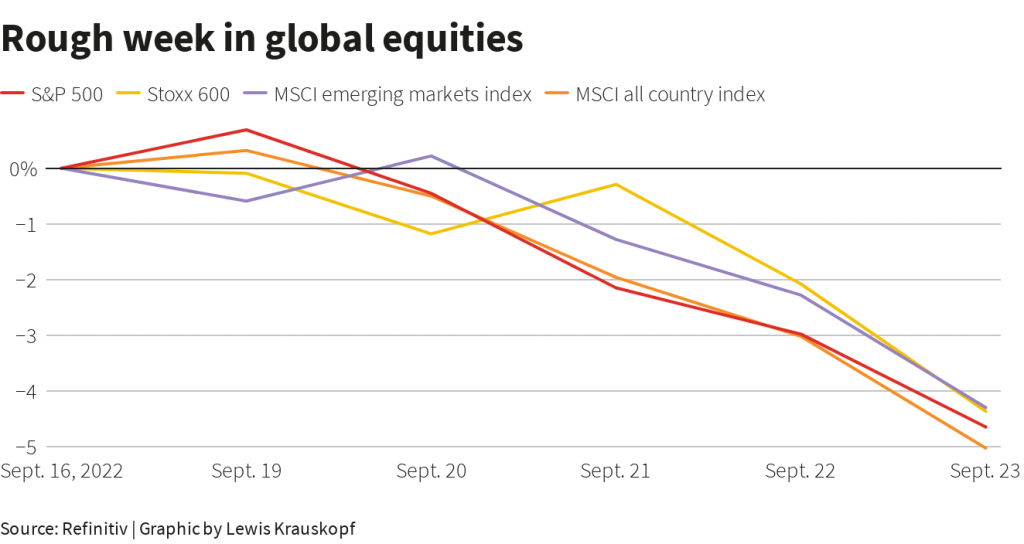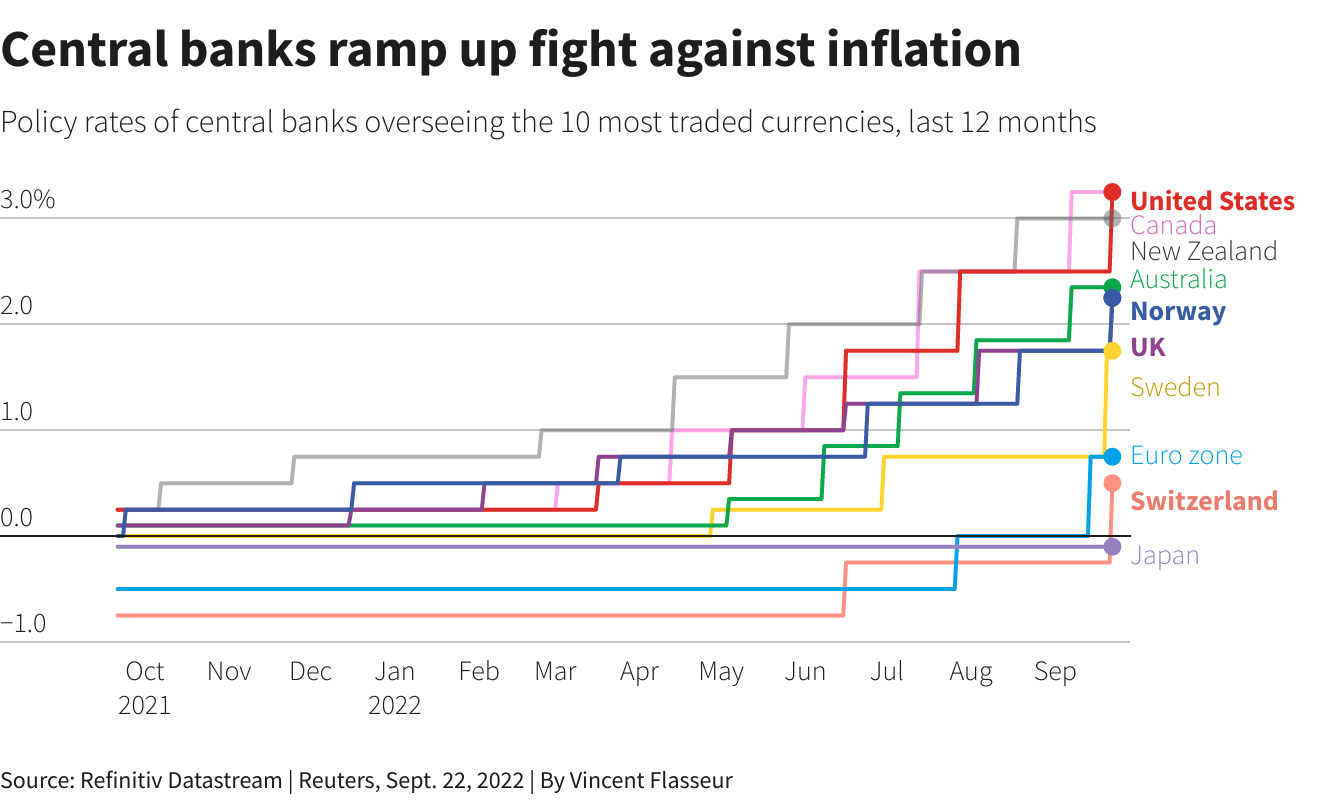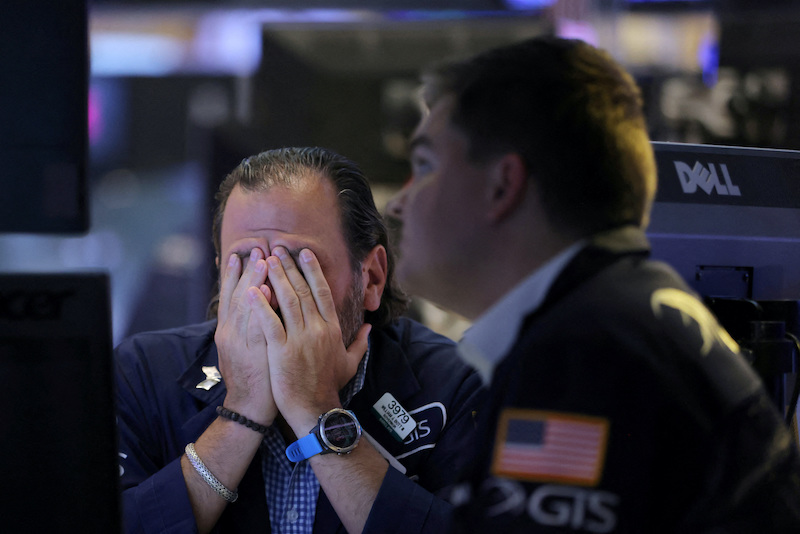Global investors are preparing for more market mayhem after an extraordinary week of rate hikes that savaged asset prices around the world, as central banks ramped up the fight against inflation.
The Federal Reserve delivered its third straight 75 basis point rate hike while Japan intervened to shore up the yen for the first time since 1998. The British pound slid to a fresh 37-year trough against the dollar after the country’s new finance minister unleashed historic tax cuts and huge increases in borrowing.
“It’s hard to know what will break where, and when,” said Mike Kelly, head of multi-asset at PineBridge Investments (US). “Before, the thinking had been that a recession would be short and shallow. Now we’re throwing that away and thinking about the unintended consequences of much tighter monetary policy.”
Stocks plunged everywhere. The Dow Jones Industrial Average nearly joined the S&P 500 and Nasdaq in a bear market while bonds tumbled to their lowest level in years as investors recalibrated their portfolios to a world of persistent inflation and rising interest rates.
Risk of Worldwide Recession
Towering above it all was the US dollar, which has rocketed to its highest level in 20 years against a basket of currencies, lifted in part by investors seeking shelter from the wild market swings.
“Currency exchange rates … are now violent in their moves,” said David Kotok, chairman and chief investment officer at Cumberland Advisors. “When governments and central banks are in the business of setting the interest rates they are shifting the volatility to the currency markets.”
For now, the selloffs across asset classes have drawn few bargain hunters. In fact, many believe things are bound to get worse as tighter monetary policy across the globe raises the risks of a worldwide recession.
“We remain cautious,” said Russ Koesterich, who oversees the Global Allocation Fund for Blackrock, the world’s largest asset manager, noting his allocation to equities is “well below benchmark” and he is also cautious on bonds.
“I think there’s a lot of uncertainty on how quickly inflation will come down, there’s a lot of uncertainty about whether or not the Fed will go through with as an aggressive tightening campaign as they signalled this week.”
Kotok said he is positioned conservatively with high cash levels. “I’d like to see enough of a selloff to make entry attractive in the US stockmarket,” he said.
The fallout from the hectic week exacerbated trends for stocks and bonds that have been in place all year, pushing down prices for both asset classes. But the murky outlook meant that they were still not cheap enough for some investors.
“We think the time to go long in equities is still ahead of us until we see signs that the market has bottomed,” said Jake Jolly, senior investment strategist at BNY Mellon, who has been increasing his allocation to short duration sovereign bonds.
“The market is getting closer and closer to pricing in this recession that is widely expected but it is not yet fully priced in.”

Goldman Sachs strategists on Friday lowered their year-end target for the benchmark US stock index, the S&P 500, to 3,600 from 4,300. The index was last at 3,693.23.
Bond yields, which move inversely to prices, surged across the world. Yields on the benchmark US 10-year Treasury hit their highest level in more than 12 years, while Germany’s two-year bond yield rose above 2% for the first time since late 2008. In the UK, five-year gilts leapt 50 bps – their biggest one-day jump since at least late 1991, according to Refinitiv data.
“At some point, the fears will shift from inflation to growth,” said Matthew Nest, global head of active fixed income at State Street Global Advisors, who thinks bond yields have moved so high they are starting to look “pretty attractive.”

Investors fear things will get worse before they get better.
“The question is now not whether we are going into a recession, it is how deep will the recession be, and might we have some form of financial crisis and major global liquidity shock,” Mike Riddell, a senior fixed income portfolio manager at Allianz Global Investors in London, said.
Because monetary policy tends to work with a lag, Riddell estimates the renewed hawkishness from central banks means the global economy will be even weaker by the middle of next year.
“We are of the view that markets are still massively underestimating the global economic growth hit that is coming,” he said.
- Reuters with additional editing by Jim Pollard
NOTE: The headline of this report was amended on September 25, 2022.
ALSO SEE:
Governments ‘Must Invest and Regulate to Cut Energy Costs’
Global Bond Losses Could be Worst Since 1949, BofA Says
























